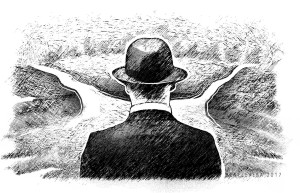
Years ago, I strolled about the seminary grounds with an Irish colleague, who kept reciting a poem, which, he said, was by Robert Frost, and whose title was, “The Road Not Taken.”
That introduced me to Frost, and set me to read his work with a passion, especially after I began writing poems myself.
Frost composed “The Road Not Taken” as a joke, after a walk with his friend, the British poet Edward Thomas, who lamented that they should have taken another route.
But, as Frost later told Thomas, when he read the poem to an audience of college students, it was “taken pretty seriously… despite doing my best to make it obvious that I was fooling.”
The poem has to do with the decisions that one makes and the “what ifs” that nag one’s mind when reminded of the passed up alternatives.
The situation has the speaker finding himself at a road junction in a wood, mulling over which of two roads he should take, and settling on the more grassy and less travelled one. Later, he reflects on how differently things might have turned out if he had taken the other road.
I shall be telling this with a sigh
Somewhere ages and ages hence:
Two roads diverged in a wood, and I—
I took the one less travelled by,
And that has made all the difference.
In his Gospel, Luke writes about two men on the road to Emmaus, a village seven miles from Jerusalem.
They met someone, who, seeing them in deep conversation, asked what it was they were discussing.
One of the two, Cleopas, told him about what had just happened in Jerusalem, how the chief priests and rulers had crucified one Jesus from Nazareth.
They had considered him a prophet and hoped that he would redeem Israel. That morning, some women from their group went to his tomb and found his body missing, and claimed that they had seen angels who told them that Jesus was alive.
The stranger exclaimed, “Oh, how foolish you are! How slow of heart to believe all that the prophets spoke! Was it not necessary that the Messiah should suffer these things and enter into his glory?” And then he recounted to them what Moses and the prophets and all the scriptures had said about the Christ.
When they reached the village, the two urged the stranger who made as if to go on, “Stay with us, for it is nearly evening and the day is almost over.”
When they were at table, Luke writes, “[H]e took bread, said the blessing, broke it, and gave it to them.” At that moment, they recognized that the stranger was Jesus, who then vanished from their sight.
Luke writes, “Then they said to each other, ‘Were not our hearts burning [within us] while he spoke to us on the way and opened the scriptures to us?’’
Immediately they returned to Jerusalem and told the apostles who were gathered there about how Jesus walked with them on the road to Emmaus and how he revealed himself to them in the breaking of the bread.
Luke does not tell us the purpose of the two men in going to Emmaus.
But I suspect that they had their home in that village. Being followers of Jesus, they were with him in Jerusalem—from his triumphant entry into the city to his arrest and scourging—and, from a safe distance, saw his trek to and crucifixion on Calvary, which must have dashed their high expectations of him as the savior of Israel.
Apparently, not even reports of Jesus’ body being missing and of angels announcing his being alive were of help. In their disappointment, they must have decided to return to Emmaus and pick up their lives.
But then there appeared a stranger and with him another road—the road of faith, the road back to Jerusalem.
The stranger explained to them that what had happened fitted in with the prophecies—of a great number, some of which went back seven hundred years—about the Messiah, that he would suffer and die and be glorified.
The stranger revealed his true identity when he blessed, broke and gave the bread to them. I have a feeling, however, that, even before this, because their hearts were burning when he spoke to them and they had invited the stranger in, they had believed him, and Jesus’ disclosure of his identity merely confirmed their faith.
And so another road opened itself to the two disciples, which led back to Jerusalem and the acceptance of Jesus’ death and rising, an acceptance that bordered on celebration. Jesus offered them a second road, a road less travelled by because those who take it must walk by faith.
Disclaimer: The comments uploaded on this site do not necessarily represent or reflect the views of management and owner of Cebudailynews. We reserve the right to exclude comments that we deem to be inconsistent with our editorial standards.
